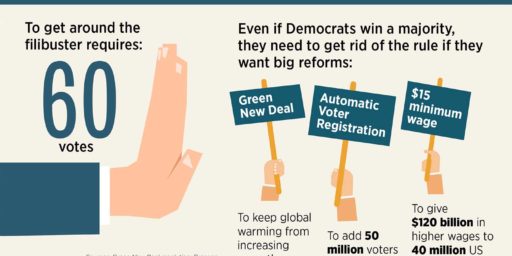Sinema’s Filibuster Defense
It's no better than Joe Manchin's.

Back in April, West Virginia Senator Joe Manchin defended the filibuster in a Washington Post op-ed that mostly displaced wishful thinking and a lack of historical understanding. Today, the paper let Arizona Senator Kyrsten Sinema give it a whirl in an op-ed arguing “We have more to lose than gain by ending the filibuster.”
Her opener is not strong:
Everyday Arizonans are focused on questions that matter most in their daily lives.
Is my job secure? Can I expand my business? Can we afford college? What about health care? When can I retire? Is my community safe?
Meanwhile, much of Washington’s focus is on a Senate rule requiring 60 votes to advance most legislation.
So, what if the reason much of Washington is focused on this Senate rule is that it’s stopping the passage of legislation addressing the issues that matter most in the daily lives of Americans, including those from Arizona?
Arizonans expect me to do what I promised when I ran for the House and the Senate: to be independent — like Arizona — and to work with anyone to achieve lasting results.
Lasting results — rather than temporary victories, destined to be reversed, undermining the certainty that America’s families and employers depend on.
So, the way democracy is supposed to work is that the people elect representatives to make laws. If those laws are popular, they re-elect said representatives to keep making laws. If those laws are not popular, they elect new representatives to repeal the unpopular laws and pass different ones. And so on and so forth.
The best way to achieve durable, lasting results? Bipartisan cooperation.
But what if one of the two parties systematically refuses to compromise? What if their entire legislative agenda in the last eight-and-a-half years of opposition-party Presidents, going back to 2009, is the provide zero votes for legislation that’s even slightly controversial? What if they won’t vote even for programs popular with their own constituents if the other party gets the credit?
I understand bipartisanship seems outdated to many pundits. But the difficult work of collaboration is what we expect in Arizona. And I still believe it is the best way to identify realistic solutions — instead of escalating all-or-nothing political battles that result in no action, or in whipsawing federal policy reversals.
So, very few pundits are opposed to bipartisanship. Indeed, a fetish for bipartisanship would fairly characterize more national-level pundits. The problem is that, even when Presidents and Congressional leaders go out of their way to secure bipartisan support—with the Affordable Care Act the best example in the current era—it simply goes nowhere.
Since I was elected to Congress, a bipartisan approach has produced laws curbing suicide among our troops and veterans, boosting American manufacturing, delivering for Native American communities, combating hate crimes, and protecting public lands.
You were elected to Congress in 2012. Nine years ago. That’s not exactly an impressive list of accomplishments for that span.
Eventually, she gets to her strongest point:
Once in a majority, it is tempting to believe you will stay in the majority. But a Democratic Senate minority used the 60-vote threshold just last year to filibuster a police reform proposal and a covid-relief bill that many Democrats viewed as inadequate. Those filibusters were mounted not as attempts to block progress, but to force continued negotiations toward better solutions.
And, sometimes, the filibuster, as it’s been used in previous Congresses, is needed to protect against attacks on women’s health, clean air and water, or aid to children and families in need.
As best I can tell, rather than forcing compromise toward “better solutions,” the police reform and COVID relief filibusters simply killed the legislation. This term, Republicans will almost surely filibuster the Democrats’ police reform bill.
But, yes, it’s true that the filibuster occasionally kills bills Democrats dislike.
Regardless, Sinema’s major argument for the filibuster—and I must confess, it’s not one I’d seen trotted out much until quite recently—is that it provides stability.
My support for retaining the 60-vote threshold is not based on the importance of any particular policy. It is based on what is best for our democracy. The filibuster compels moderation and helps protect the country from wild swings between opposing policy poles.
To those who want to eliminate the legislative filibuster to pass the For the People Act (voting-rights legislation I support and have co-sponsored), I would ask: Would it be good for our country if we did, only to see that legislation rescinded a few years from now and replaced by a nationwide voter-ID law or restrictions on voting by mail in federal elections, over the objections of the minority?
To those who want to eliminate the legislative filibuster to expand health-care access or retirement benefits: Would it be good for our country if we did, only to later see that legislation replaced by legislation dividing Medicaid into block grants, slashing earned Social Security and Medicare benefits, or defunding women’s reproductive health services?
To those who want to eliminate the legislative filibuster to empower federal agencies to better protect the environment or strengthen education: Would it be good for our country if we did, only to see federal agencies and programs shrunk, starved of resources, or abolished a few years from now?
This question is less about the immediate results from any of these Democratic or Republican goals — it is the likelihood of repeated radical reversals in federal policy, cementing uncertainty, deepening divisions and further eroding Americans’ confidence in our government.
So, there’s something to this argument. Wild swings in things like the retirement age, the taxation of IRA accounts, the mortgage interest deduction, and the like wreak havoc on planning. But, for the most part, democracy acts as a rheostat in a positive way.
My guess is that “slashing earned Social Security and Medicare benefits” would be wildly unpopular. Even ObamaCare, which Republicans hate by that name has been really hard to “repeal and replace,” because many of the particulars are popular.
But, if one supports expanded abortion access and voting access, it’s odd, indeed, to argue that we shouldn’t have those things unless we can guarantee that they’ll be around forever. And, frankly, even if Republicans take back the House and Senate next year, they’re not going to do so by margins wide enough to override President Biden’s veto. So, we’re talking about an eventuality where Republicans sustain control of both Houses of Congress and then retake the White House. At which point, they ought to be able to govern.
And to those who fear that Senate rules will change anyway as soon as the Senate majority changes: I will not support an action that damages our democracy because someone else did so previously or might do so in the future. I do not accept a new standard by which important legislation can only pass on party-line votes — and when my party is again in the Senate minority, I will work just as hard to preserve the right to shape legislation.
That’s fair enough. But, realistically, if Republicans end the filibuster in 2023, Democrats aren’t bringing it back the next time they have a majority.
The rest of the piece is a combination of self-promotion and hope for bipartisan cooperation that won’t be forthcoming.






“Sinema lies to constituents the same way that bosses lie to employees. In vaguely self-help-book language and with the unmistakable tone of someone who does not give half a shit whether anyone believes her.
This is one of the most intellectually insulting things I’ve ever read.”
-Ed Burmilla
It’s baffling that Sinema and Manchin agreed to defend their indefensible positions by publishing such lame rationalisations, that fail the most basic empirical analysis. Every other democracy on the planet, as far as I know, together with most if not all American states, operates on the simple principle that a bill which attracts a majority of votes in the legislature becomes the law of the land. They do this without any of the dire consequences Manchin and Sinema predict.
Their position amounts to this: they claim to be Eminent Tribal Elders, elected not because of the policies and objectives their parties campaigned on, but because their exceptional personal qualities will allow them to rule the nation in cooperation with their equally wise Senate colleagues, some of whom happen to belong to another party. Their arrogance is almost as insufferable as their smug bovine stupidity.
@Teve: The tragedy is that Sinema will probably switch parties, or run as an independent, if Democrats mount a primary challenge to her. This is what happens when the whole legislative process ends up in the hands of two or three senators with delusions of exceptional wisdom.
Really, really sick of this woman.
She’s not going to get *any* results, let alone “lasting results” given the status quo. Which apparently is fine with her. She still gets paid either way and gets to posture as someone above partisan interests.
Like I wrote the last time she offered a version of this defense:
Short version: a system wherein elections can have serious policy consequences and politicians and parties have to campaign on those policy consequences is what representative democracy is supposed to be.
@Paine:
The people who win GOP primaries in AZ are nuts like Paul Gosar and Debbie Lesko, Sinema can never pass for a wingnut with her Green party history.
She is also bisexual and not religious, that is not going to fly in the Jesus party.
@Ken_L:
Sinema can’t win a Republican primary in Arizona.
This, all of this nonsense, comes down to the simple concept that Status Quo is God. It’s better to keep what broken, abused system you have than risk trying to change it; thus it’s better to let one party consistently damage what they think is too big to fail than alter a piece of it that will change the outcome. Someone constantly poking holes in the hull of the Titanic is fine because it can’t sink but god forbid we alter course and affect arrival times!! Liberals are perceived as inherently wanting to change how government works and shouldn’t be trusted with change. Their rule is subconsciously illegitimate to many, even their own constituents who balks at using the power elections give them to actually DO anything meaningful. Conservatives, claiming to want to conserve things as is, get the benefit of the doubt even when caught torching the place. Concepts like “stability” are assumed to just happen with conservatives in power regardless of what’s actually happening.
This is why Sinema’s argument are crap – “stability” is what the MAGA crowd will tell you what we’ve had these last chaotic years but suddenly Biden’s middle-of-the-road actions are radical AF. “Stability” is the same as “rational” to them – an inherent quality or state of being rather than the result of behavior. Liberals cannot reliably keep a majority, not because the system has been rigged to make that extremely difficult, but because they are “unpopular” and of course the GOP is going to repeal everything they do as a matter of course. The GOP taking away things is not considered a threat to stability or bipartisanship – it’s nature correcting uppity liberals changing things they should never have touched.
Everyone of these Red States that are enacting un-democratic election laws is doing it without a supermajority requirement…not of them is allowing the Democratic minorities in their legislatures to de-rail their election theft agendas.
But once again Democrats in Washington are taking cupcakes to a gun fight.
We did not work our asses off, and dig deep into our pockets, to win the WH and the Senate for Manchin and Sinema to simply cede that power back to McConnell.
FFS…Chuck Shumer has to be the biggest pussy in New York.
Oh for an edit function…
Sinema offers a tepid defense of what the filibuster is supposed to be, not of what it actually is.
@Ken_L: “It’s baffling that Sinema and Manchin agreed to defend their indefensible positions by publishing such lame rationalisations, that fail the most basic empirical analysis. ”
No, rather it’s contempt for their voters and contempt – well, for everybody except their paymaster.
Note Ed Burmilla’s quoted comment. We see this regularly, when somebody plops a turd on our plates and calls it bratwurst.
Sinema and Manchin are going to look pretty stupid when the R’s gain control and ditch or modify the filibuster.
@Sleeping Dog:
Mitch proved himself impervious to some whining, when trump complained about the filibuster. I don’t know why he never tried to eliminate it. Perhaps as his goal is not to pass legislation, the filibuster makes him look less obstructionist than he would by simply never scheduling any bills for a vote.
This won’t last, because eventually the GOP will want to pass something that can’t go through reconciliation, and then the filibuster would be tossed aside.
Conversely, if it really is such a valuable rule, should we not expect a future GOP senate to simply reinstate it?
@Kathy: I expect the filibuster to ‘survive’, in zombie form. They’ll stiletto it in Robert’s fashion, whenever it gets in their way. That is to say it will be on the books, but won’t be allowed to obstruct serious GOP priorities.
If the GOP manage to succeed at even half of what they are doing now, the GOP will not worry about a Democratic Senate. A large number of states will have gerrymandered-in-place GOP legislative majorities with layer upon layer of GOP protection. And when those layers fail, the legislatures will be able to overturn district results or the entire state’s election results at will.
At that point the GOP leadership won’t worry about what a Democratic Senate will do, because it would be unlikely, short-lived, and always dealing with a GOP House, if not Senate, and a Federalist Society SCOTUS.
And also at that point, any Dem resistance will seem even more illegitimate, and the GOP will be very, very spoiled. They’ll just override filibusters at will, with the only question being do they do it and say they didn’t, or just admit that the filibuster is dead?
@Sleeping Dog: This seems to be inevitable.
K. Drum on the filibuster
@Steven L. Taylor: ” This seems to be inevitable.” (re: the GOP ditching the filibuster when they feel the need).
I expect Manchin to be a GOP senator by that time.
Sinema and Manchin (and the ~5 Democrats hiding behind them) don’t make sense. They can’t claim the procedural filibuster protects American democracy when said filibuster is being abused to block bills necessary to protect American democracy, bills supported by representatives of the majority of Americans.
The filibuster is not in the Constitution. Voting rights is. It’s pretty pathetic Manchin, Sinema, and the cowards hiding behind them do not understand that. At thid point, these Democrats are working with a radical right wing necommunist GQP minority to weaken the American republic. Not good.
@Dude Kembro: What puzzles me is that the GOP’s strategy is very clear – they will control the results of elections, no matter where in the process they need to interfere (right now, they are gaining that power at all steps in the process).
That cuts into the power of Dem Senators because:
1) They are less likely to have a Dem House,
2) They are less likely to have a Dem President,
3) They are more likely to see a GOP SCOTUS block whatever they still manage to accomplish,
4) They are less likely to be in the majority in the Senate.
One could say that that makes the filibuster more important, but only as a refuge in exile for the losing side in a war.
And that last only matters if the GOP maintains the filibuster after they really don’t need it any more. TL;DR they are expecting the GOP to be magnanimous in final victory.
If this really means nothing gets done until after the GOP retakes power, then someone powerful (maybe a few steps below Biden for plausible deniability) needs to tell Both Manchin and Sinema that they are going to be pushed out of the Party and treated as members of the GOP (Democrats in name only, but clearly looked at as members of the GOP) and primaried.
If they are not part of the solution then they are part of the problem and they seem to refuse to be team players, so they need to be pushed to the GOP side. Now, they may not have figured out (yet) that they will have below 0% influence when they are part of the what would now be the Majority GOP Senate who does not need them (in fact they already have them, since both Senators are not helping Democrats pass legislation, but we should formally push them into the GOPs hands), but such is life.
For a brief moment we were looking at Manchin and Sinema as a couple of star Football players that we were kissing up to because having them on the team means we would win games (or pass bills, if you will), but since we have two folks who consider themselves to be star players but are refusing to join the game to help our team win, well, that is just weird, they need to go. Mitch can have them, again, the funny thing is that Mitch will be happy to take them off our hands but he is already blocking bills left and right so these two “stars” will get quite the shock to their system when they realize they have no leverage over anyone on the GOP side of the fence.
Manchin and Simema both claim they could deliver GOP votes but that is turning out to be the most BS thing out there, there are Bulls right now grazing in the prairies of Yellowstone that are snorting, and telling themselves yeah right! that these two can muster up GOP votes to help Biden’s agenda. That is so much BS, and I would know, lol!
And even if they get rid of the filibuster and do manage to pass some bills what’s to stop GOP state legislatures from simply nullifying whatever the Dems pass just as Missouri is doing now with federal gun laws? Supremacy clause be damned. They will simply not let Dems govern.
@Sleeping Dog: No. They’ll be outraged at the crassness of the Republican leadership and go back to their constituencies saying that this is all the more reason to reelect them so that they can bring bipartisanship and good government back. Rush Limbaugh never had to change the schtick simply because terrain shifted, neither will these two hairballs. There’s always an “other” to oppose.
@Just nutha ignint cracker:
I expect that Manchin will be a GOP Senator by then, and Sinema will simply be out – whether in the primary, or by the AZ GOP winning (fairly, or by cheating).
@Ken_L: “The tragedy is that Sinema will probably switch parties, or run as an independent, if Democrats mount a primary challenge to her. ”
Sinema voted to impeach Trump, so there’s no way for her to run as a Republican. And what’s her constituency as an independent?
@wr: Presumaby she has considerable local support in her home state, some of which would stay with the senator who wants to be another John McCain. I’m not suggesting that she could keep her seat, but that if Democrats primary her, she could respond by screwing up her replacement’s chances of winning.
Sinema and Manchin are both trying to own the Lieberman path.
Seems counterproductive to me, but it is the path they chose. Sinema can be replaced by a D challenger given AZ. Manchin would most likely be replaced by a RW R.
One would think that West Virginia of all places would be more progressive given the nasty and sordid history of coal mining, but what have you. You can lead a horse to water.
I have to remind myself constantly that 50% of American citizens account for 78% of elected senators.
The Senate, by design, is counter-majoritarian. Add the filibuster in and it is super-duper counter-majoritarian.
Rural rule over concentrated population centers is kinda baked-in at this point. Nothing against our rural neighbors, but acres should not count as more powerful than people in a democracy and/or a republic.
Both “democracy” and “republic” have etymological roots citing people as the salient core idea. Demos and Publis.
Total land controlled should be a very distant factor in allocating political power.